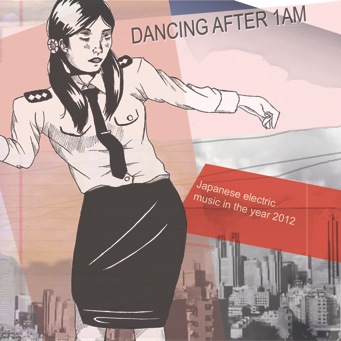
And Putting Love Away, the new EP from Tokyo’s Canopies And Drapes, takes its name from a line in Emily Dickinson’s poem “The Bustle In A House.” That work, a brief eight-line poem, deals with grieving following a death, ending with the lines “And putting Love away/We shall not want to use again/Until Eternity -.” Canopies And Drapes has the same thoughts on her mind, the three new tracks on this cassette focusing on lost love, and specifically where that feeling goes in the wake of the rupture. And Putting Love Away serves as a grim counterpart to last year’s Violet Lilly Rose Daisy, an EP which mostly focused on wants, of being consumed by the thought of another. Here’s what remains on the other side.
The subject matter isn’t the only aspect of Canopies And Drapes’ work that goes under a change on And Putting Love Away. Last year’s debut loaded up on dreamy synths and put an emphasis on CaD’s lyrics (especially lyric-book highlights “Live In The Snowglobe” and “Perfect Step”). Now, whether because she’s limited by the sonic capabilities of a cassette tape or just sonically restless, CaD’s is more concerned with minimalism and how her words sound. And Putting Love Away is a somewhat surprising change of pace for the young Tokyo artist, but one just as inviting and shady as her previous output.
Opener “The Door Into Summer” introduces us to CaD’s new approach, the twinkling overload of “Sleeping Under The Bed” replaced by bare-bones keyboard, some guitar and a nursery-rhyme-worthy beat. This stripped-down approach to songwriting places the emphasis on the vocals, and CaD’s voice rises to the challenge. The actual lyrics have become simpler than anything on Violet Lilly Rose Daisy – on “The Door,” she sings “how could I forget?/how could I help?/I still love you,” but the way those words are delivered fills them with emotional detail far more intriguing than anything a thesaurus could inspire. She draws out the first two lines, and then delivers the “I still love you” part so bluntly it sounds like she’s peaking out from a corner. Like her previous work, “The Door” boasts a strange unease, but this time it’s brought about by how minimal the song sounds. Something about its simplicity seems deceiving, so you play it again and again.
“Dead End” goes into similar eerie territory, chilly minimalism that leads way to cheesy – but still skin-crawling – horror-movie synths which bridge into the main part of the song, where CaD’s vocals practically run together to form a warm cloud of singing, the word themselves playing second fiddle to how everything blurs together. The other song, “Solaris,” chooses to be a little louder and its appeal lies in the sonic tension of the track, the claustrophobic instrumentation grinding against the sweetly sung lyrics (with a heck of a payoff too). The words are some of the least interesting CaD has penned to date, but again she’s learned how to deliver them in such a way so that a classic cliché like “there are millions of fish in the sea” becomes a sentence rich in loneliness and despair.
And Putting Love Away also comes with two remixes which don’t really add much following the excitement of the CaD songs. Moscow Club’s remix of “Solaris” is pretty typical remix fare (more electronics, basically) while Orland’s take of “Dead End” is less a remix and more of a sales pitch for Orland. If you like talk boxes and talking about how wacky the 80s were, here you go. If you like music that respects emotion, well………..
And really, that’s what is most impressive about And Putting Love Away and CaD’s musical output thus far – she’s constantly finding new ways of expressing complicated feelings, stuff way beyond “I love you” and “you don’t love me.” Last year she proved she could do that with short-story-like attention to detail, and on this release she shows she can ring the same feeling from just her sounds. Buy from here.




